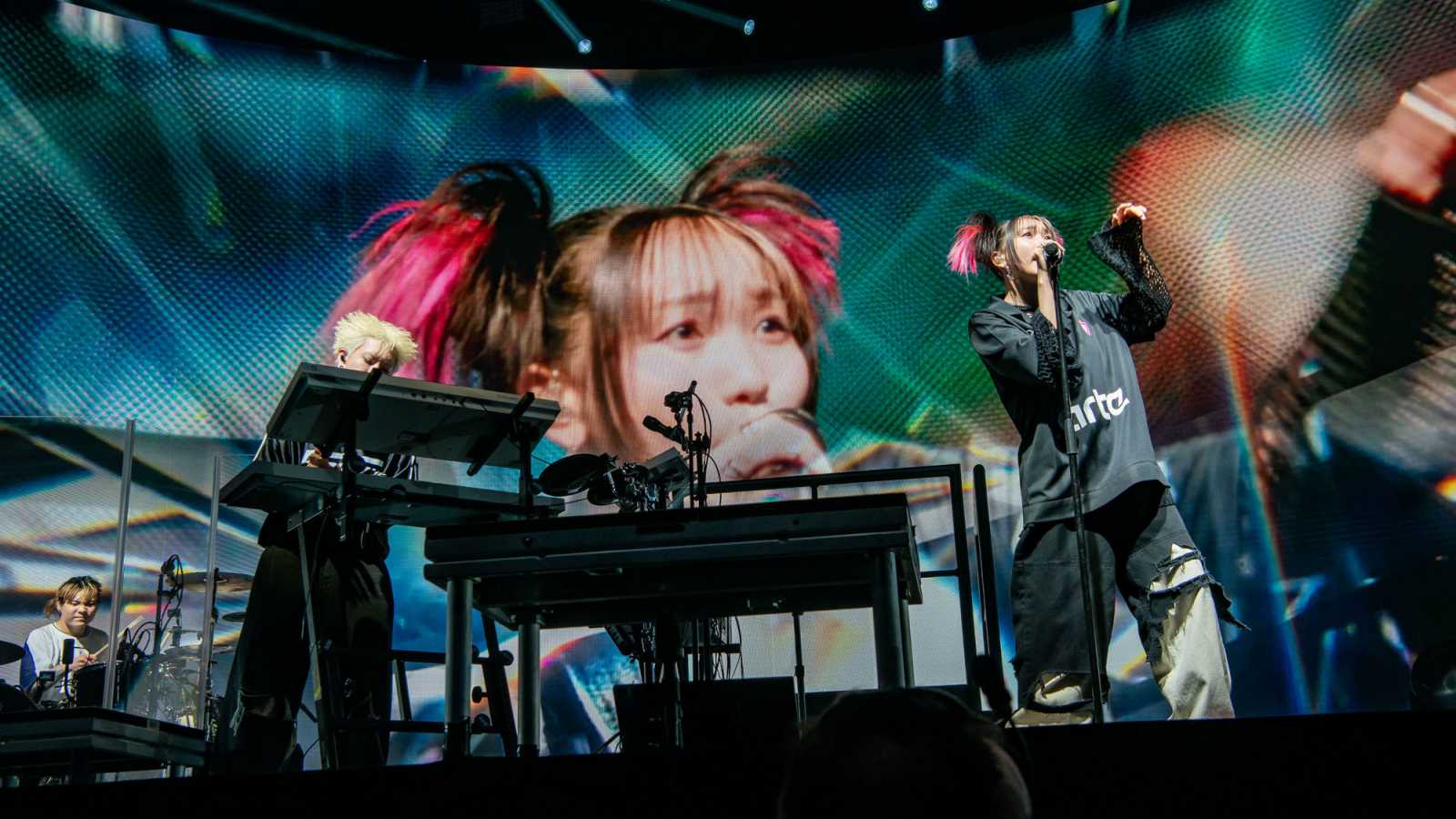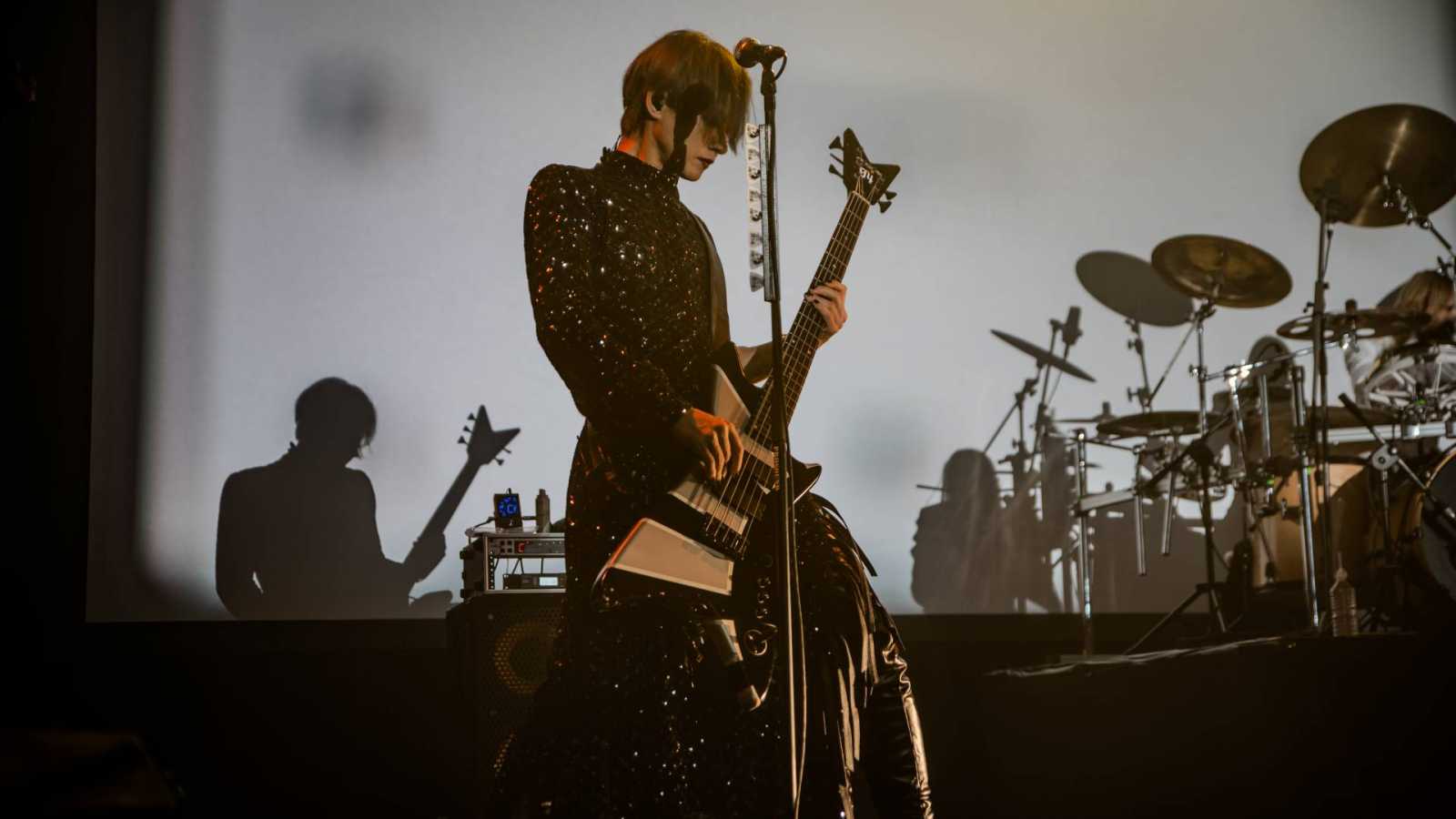no alternative is a play on its name, delivering a western alternative sound that is new and refreshing.
Through their career, deadman consistently perfected and edited their sound, becoming sharper and more sophisticated. Their theme was maintained by dramatic front man Mako, but their sound grew in talent with each release, thanks to composer aie. no alternative was a turning point for the band, and after the release, their sound stayed consistent with this new western alternative vibe.
The intro track is just a basic drum beat which opened for Moumoku no hane to hoshi wo te ni, one of most moving songs on the album. The song has a gorgeous flowing guitar opening and crooned lyrics, and by the time it leaps into full sound, it has already captured your full attention. While the song has sad vocal undertones, its arrangement jumps around and includes energetic and sometimes cheerful bursts throughout. In the end however, it is Mako who really brings the sound home in beautiful but melancholy ranges, making this a strong song for the CD.
Kunou no naka no taegatai sonzai is a very different sound from its predecessor, and we see a lot more of the rock mix. While the song is fairly slow, it has a great guitar solo and a good beat. The track only builds up right before the chorus, where we hear Mako sing in extremely high pitch and slightly off key, but it is entertaining nonetheless. Jukeisha no nikki blows Kunou no naka no taegatai sonzai out of the water however, starting with a very hard rhythm and Mako raspily singing, making the previous song's vocal range look like child's play as he nails the vocals in Jukeisha no nikki. We hear everything from desperation to haunting whispers before the catchy chorus that is backed up by aie's chanting background vocals. The arrangement of this song touches many ideas, giving the song a well rounded mix of sound.
Gin no parasol introduced yet another new sound, providing a jazz style arrangement, which makes the song one easy to dance around to. The vocals are equally bouncy, and with the powerfully chanted chorus, the song has a really fun overall feel. This paves the way for their first slower song, Dorisu kara no tegami, which has a very basic composition but continually builds and delivers during its choruses. An interesting aspect of Dorisu kara no tegami is the amount of time spent focusing on Mako's vocals. He goes from whispering in a childlike way to crooning held notes in the chorus, and for forty seconds throughout the song, he painfully hums the beat aloud, leaving a haunting impression.
rem. has the most western sound on the album, starting with a very loud instrumental opening which becomes extremely muted during the first stanza before bursting back to life as Mako begins to belt out the vocals. While the composition goes from fast to abruptly slow several times, it explodes in energy during the first chorus. From that point on, it maintains a much faster and cheerful vibe not only instrumentally, but vocally.
imp is no alternative's odd one minute intermission track with a grating beat of guitar and drums that continues in repetition until you just want to turn it off. It proves to be an extremely long opener for lunch box, which it transitions flawlessly into, and is part of lunch box's basic beat. This is another one of the album's best songs, with a constant play on vocal manipulation and plenty of range from Mako, as well as a really great rhythm provided by aie on guitar. Being one of the harder songs on the album, lunch box provides our first headbanging opportunity and plays up the enthusiasm aspect. It is definitely is a song designed to sound great on CD but even better in concert.
in media is the second jazz song on the album and sounds very much like gin no parasol with the dance style arrangement and poppy vocals. The track is very catchy and you can't help but tap your toes to this cheerful tune. Mako continues to demonstrate his vocal capabilities in this song, proving he's full of surprises. circus is a strange choice for a follow up song, with a steady headbanging beat and a much rougher rock sound. Most of the vocals in circus are accompanied by background vocals except for the chorus and preceding stanza, which are full of Mako's charismatic emotion before launching back into the rough rhythm the song offers. Despite the transition from its predecessor, it's an exciting addition to the CD.
through the looking glass is one of the most popular tracks off this album and is the one where TAKAMASA's bass skills truly shine. This is the craziest song off the album, with shouts and screams, taunting vocals and a heavy bass line. The chorus is chanted and accented with background vocal shouts and a darker drumbeat, hinting that this is another track to be appreciated on CD but loved in concert. It provides plenty of opportunity to jump around and dance while still delivering the hard rock headbanging aspects that all fans enjoy.
quo vadis is a great follow-up track to through the looking glass and another very popular live song. It continues the rock beat with crazy vocals and a heavy rhythm. Again we have shouted and screamed background vocals and a wild guitar arrangement, but this suddenly drops off to a slow beat with droning vocals that hold raspy inflection. The song then shows us what it has been building up for, launching into a screaming finale with a violent headbanging beat that speeds up as fast as it can before ending dramatically.
Ariduka is the cool down song on the album and has a very slow beat and almost monotone vocals that lead into a slight croon before stopping abruptly. This repeats several times before Mako holds a note for over ten seconds, and the song lurches into a heavy but deliberate beat. The midway point of the song is the most exciting, with a much faster sound and harmonious vocals from both Mako and aie before it falls back to the slower beat again. We hear the high points once more towards the end though, making the lagging rhythm worth the wait.
While °C is TAKAMASA's last release, no alternative is a testament of everything he'd learned wrapped up into one neat album which was left in his wake. The album shows strength, experimentation and the drive to continue and succeed, making it one of the best from deadman's discography.



